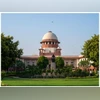The Supreme Court on Thursday stayed a government notification of March 20 establishing a fact-checking unit to verify news items appearing in the media about the government.
The Press Information Bureau’s “Fact Checking Unit” (PIB FCU) was to act as a “deterrent” against creating and disseminating fake news or misinformation regarding the “business” of the Centre.
A three-judge Bench headed by Chief Justice of India (CJI) D Y Chandrachud said the notification would remain stayed until a third judge of the Bombay High Court took a final decision on the validity of Rule 3(1)(b)(v) of the Information Technology (Intermediary Guidelines and Digital Media Ethics Code) Rules, 2021.
The court also said the validity of the rules involved serious constitutional questions and impacted the fundamental right to speech and expression.
The Bombay High Court had on January 31 given a split verdict on a plea challenging the validity of the unit under the Rules in question. A third judge had refused to stay the fact-checking unit on March 11.
Also Read
The verdict was on petitions filed by stand-up comedian Kunal Kamra, the Editors Guild of India, the Association of Indian Magazines, and the News Broadcast and Digital Association, challenging Rule 3 of the IT Rules. The rule gives the central government the right to form an FCU to identify fake or false news.
The fact-checking unit is empowered under the Rules to tag what it considers fake news online concerning any activity of the central government.
The government notified the Information Technology (Intermediary Guidelines and Digital Media Ethics Code) Amendment Rules, 2023 (IT Rules) on April 6, 2023. This is the second amendment to the original IT Rules notified in February 2021, and they were earlier amended on October 28, 2022.
The IT Rules state intermediaries such as Facebook, X and other social media platforms will have to make “reasonable efforts” to ensure that users do not upload information about the central government “identified as fake or false or misleading”.
Kunal Kamra, in collaboration with the Internet Freedom Foundation, had moved court, challenging the constitutionality of the fact-checking unit.
He alleged the new IT Rules could lead to his content, which is mostly political satire, being arbitrarily blocked or his social media accounts being suspended or deactivated. This would harm him professionally, he said.
The Union government had said that the unit might only identify fake or false or misleading information and not any opinion, satire, or artistic impression.

)
